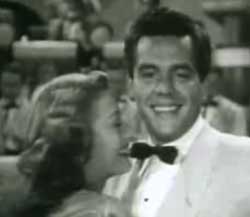 Desi Arnaz, a couple years before Desi met Lucy, stars in the quarter-hour musical short Melody Masters #5: Desi Arnaz & His Orchestra (1949), with guest vocalists Judy Clark & "Dulcina."
Desi Arnaz, a couple years before Desi met Lucy, stars in the quarter-hour musical short Melody Masters #5: Desi Arnaz & His Orchestra (1949), with guest vocalists Judy Clark & "Dulcina."
Originally it was issued as Jitterumba (1947) in the series of Universal "Name Band Musical" shorts.
Desi performs the Ernesto Lecuona composition "Tabu" behind the opening credits, then he appears in front of his orchestra in a niteclub setting singing "El Combanchero." He's singing in Spanish & is quite a thrilling performer with a first-rate orchestra.
Jump-cut to a stage which has been dressed up to look like a college lecture hall. Desi begins singing: "Will you kindly open our geography/ Let us turn to page one hundred twenty three," then continues with "Managua Nicaragua," a novelty number in praise of the heavenly town where senoritas are beautiful.
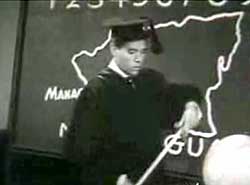 "Managua Nicaragua" is not a very good song & his performance is further ruined by not having the orchestra present, for during the instrumental break he just has to kill time standing in front of the students, having received no direction what to do when not singing. "Managua Nicaragua" is not a very good song & his performance is further ruined by not having the orchestra present, for during the instrumental break he just has to kill time standing in front of the students, having received no direction what to do when not singing.
Not to fear, it gets good again. Back in the niteclub Desi introduces "our feature Latin vocalist," who Desi remarks had just finished a successful New York engagement singing for, uhm, who was it Desi wonders forgetfully, oh, Xavier Kumquat -- a tease toward his fellow Latino bandleader, Xavier Cugat.
Out comes the one-name singer Dulcina. She practically flies onto the stage doing the rhumba, svelt, & pretty. Never letting up the fierce dancing, she sings a rhumba in Spanish, titled "Boteando."
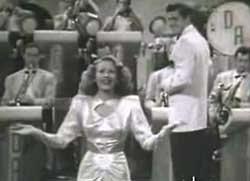 That exciting singer is followed by another vocalist, Judy Clark, who does a novelty tune: That exciting singer is followed by another vocalist, Judy Clark, who does a novelty tune:
"Tell the band to stop playing those congas/ Stop playing those sambas/ Stop playing those rhumbas/ South American music is fine/ But how long can I wiggle my spine/ Ow! My back is a wreck & I'm throwing my neck out of line..."
Not the greatest song but Judy makes the most of it giving a comic performance. Desi seems not to like it either, interrupting her to say, "Wait a minute! Wait a minute! What kind of a song is that? Whatever happened to the good neighbor policy, huh? It's a conspiracy, that's what it is, a conspiracy to put me & Cugat out of business! Cugat I don't care about. What's going to happened to Arnaz?"
Desi continues his comedy monologue in which he posits that jive music & jitterbug is more dangerous to the spine than Latin rhythms & rhumba. He then begins a parody of Cab Calloway (doing it very badly), leading into a tune called "I'll Take the Rhumba":
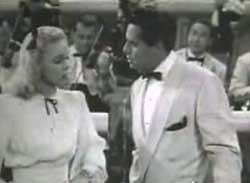 "Listen all you hep-cats & you jitterbugs/ You don't know the tortures I go through/ Brother it's rough/ Enough is enough/ I've done all the rug-cutting ai-yai-yai I'm gonna do/ "Listen all you hep-cats & you jitterbugs/ You don't know the tortures I go through/ Brother it's rough/ Enough is enough/ I've done all the rug-cutting ai-yai-yai I'm gonna do/
"Tell the band to stop jivin' & jumpin'/ Stop stumblin' & tumblin'/ Stop beating & bumpin'/ I'm so tired of diggin' those chicks/ Who are hep to those solid hot licks/ And I'm flat on my feet from the beat/ While they're getting their kicks..."
It continues on a bit, slightly offensive, terribly offensive when he reaches the line about "swinging like apes," but it's even worse just for failing to be funny.
It's a bit more fun when he demonsrates how to do the rhumba (with Dulcina) then the "lindy-hoop," asking the audience to vote which is more apt to cause injury. Dulcina does a nice bit of "lindy-hoop" while Desi camps it up as if in pain. The whole bit seems aimed at old folks, & really Desi could've been more hip than that, so this final number is a bit of a shame.
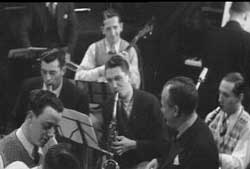 For the June 1931 "issue" of "The Pathetone Weekly" cinema magazine, the title card reads in its: "Another unconventional recording interview with Jack Hylton & his Boys." For the June 1931 "issue" of "The Pathetone Weekly" cinema magazine, the title card reads in its: "Another unconventional recording interview with Jack Hylton & his Boys."
We are permitted to intrude on a practice session of Hylton's band, with a first & second tenor working out their interpretation of the mournful lyrics: "I knew how things would be/ It was so plain to see/ The day you went away from me/
"You lived on flattery, thinking that it was love/ And now you seek my sympathy/ You gave to someone else something divine/ You gave to someone else that which was mine/
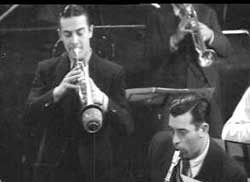 "You left me for my friend/ Knowing that i loved you/ Now back to me you wend/ What can I do?" "You left me for my friend/ Knowing that i loved you/ Now back to me you wend/ What can I do?"
We can't see the tenors well, with the camera positioned overhead, but the lead tenor is Pat O'Malley. It has been suggested that Billy Munn is murmuring some lyrics beside Pat.
The camera pans over the heads of the musicians as they do their instrumentation, but since it's "just" a rehearsal, they shuffle about in their seats a bit, & are facing every which way concentrating on sheet music.
Yet if it's not just a pretense of a rehearsal acted out for the camera, how great these guys were to flub nothing one bit. And that mute horn solo was just heartbreaking.
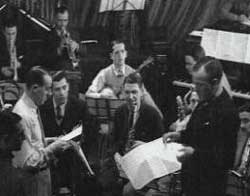 The full text of the title card is "The Magic Box: A Patheton Item in which we meet Jack Hylton & His Band" (1931). The full text of the title card is "The Magic Box: A Patheton Item in which we meet Jack Hylton & His Band" (1931).
A second text card informs us: "Every day busy workers are transforming pieces of wood and metal into magic boxes (Radio-Gramophones). Here is a 'plant' that grows them. The commentator is Rex Palmer, known to millions as Uncle Rex'."
The six minute film shows us factory workers constructing combination radio-grammaphones, as the narrator explains the assembly we are observing of "ingenius machines," with over sixteen-hundred separate parts in each radio-grammaphone."
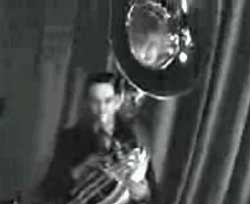 We're then taken to a radio studio where Jack Hylton & his Merry Men are rehearsing, & the film jump-cuts back & forth between showing the performance & the workers. We're then taken to a radio studio where Jack Hylton & his Merry Men are rehearsing, & the film jump-cuts back & forth between showing the performance & the workers.
it's an awkward film in that there's no visual harmony between what looks like an industrial film vs the musical film.
Although seeing radio-gramaphones but together is not uninteresting, only when Hylton's orchestra finally gets focused on performing "Choo Choo" does it all comes to life.
The instrumentation works in imitation "woo woos" of a train whistle & Pat O'Malley takes the lead vocal on the novelty number, backed by a harmonizing trio going Wah-OOO-wah-OOO, which we may assume's a different train whistle.
The cutesie lyrics run their course then we hear more bells & whistles & someone calling out like a train conductor, as the orchestra winds up on bouncy instrumental with sundry solos imbedded. Because it pretends to be a rehearsal only, some of the musicians stand up & wander about wherever the arrangement excludes them.
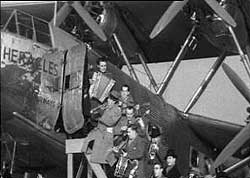 On the Air -- In the Air, with Jack Hylton & His Band (1933) has a title card informing us the band is off to "broadcast their airs on the air." On the Air -- In the Air, with Jack Hylton & His Band (1933) has a title card informing us the band is off to "broadcast their airs on the air."
The film jump-cuts from a mimed performance on a Croydon, Surrey airfield, on the boarding-stairs to a biplane used for mail service, then a Post Office exhibition in the Strand in London.
The band is headed for a gig at the Strand, journeying on the biplane. We see the band crowded tight inside the biplane named Heracles (a Handley Page HP 42 airliner of which only eight were built).
They begin practicing one of their numbers together, with shots outside the windows & of the pilot & even from outside the biplane in the air.
The plane lands in London, & Hylton is greeted apparently by the news upon disembarking. the film doesn't really give a full performance but is much closer to a newsreel about the band's arrival. So it's probably more of interest for the vintage airplane than for a fragmented partial performance.
copyright © by Paghat the Ratgirl
|
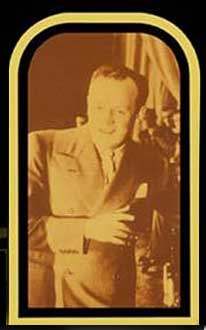

 "Managua Nicaragua" is not a very good song & his performance is further ruined by not having the orchestra present, for during the instrumental break he just has to kill time standing in front of the students, having received no direction what to do when not singing.
"Managua Nicaragua" is not a very good song & his performance is further ruined by not having the orchestra present, for during the instrumental break he just has to kill time standing in front of the students, having received no direction what to do when not singing. That exciting singer is followed by another vocalist, Judy Clark, who does a novelty tune:
That exciting singer is followed by another vocalist, Judy Clark, who does a novelty tune: "Listen all you hep-cats & you jitterbugs/ You don't know the tortures I go through/ Brother it's rough/ Enough is enough/ I've done all the rug-cutting ai-yai-yai I'm gonna do/
"Listen all you hep-cats & you jitterbugs/ You don't know the tortures I go through/ Brother it's rough/ Enough is enough/ I've done all the rug-cutting ai-yai-yai I'm gonna do/
 "You left me for my friend/ Knowing that i loved you/ Now back to me you wend/ What can I do?"
"You left me for my friend/ Knowing that i loved you/ Now back to me you wend/ What can I do?"
 We're then taken to a radio studio where Jack Hylton & his Merry Men are rehearsing, & the film jump-cuts back & forth between showing the performance & the workers.
We're then taken to a radio studio where Jack Hylton & his Merry Men are rehearsing, & the film jump-cuts back & forth between showing the performance & the workers.